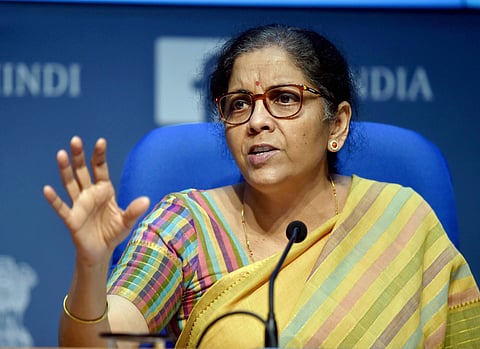Unfair to dump centre’s GST default on states
The Goods & Services Tax (GST) Council, chaired by Finance Minister Nirmala Sitharaman, met on Thursday to sort out the pricky problem of the huge backlog of compensation to states. The meeting unfortunately has confounded the confusion. The crux of the problem is that compensation has not been paid as the Central government has not been able to meet revenue targets.
GST collections have dropped drastically, with the widespread lockdowns freezing economic activity. When the GST became law, state governments were assured they would be compensated for five years till 2022 in case the collections fell short. The finance minister has now refused to shoulder the burden, blaming it on the coronavirus outbreak and terming it “an act of God”. Sitharaman said the shortfall in the current year may be a whopping Rs 2.35 lakh crore.
For the last financial year, the Centre had released Rs 1.65 lakh crore to the states, while the cess collected was only Rs 95,444 crore. The ‘solution’—asking state governments to borrow to tide over the shortfall—is rubbing salt in old wounds. The states have been offered two options. One is that the Union government will arrange a line of credit for the entire sum of Rs 2.35 lakh crore to the states, with the guarantee that this will have to be repaid only from the sixth year, i.e. 2022 onwards, from the compensation cess fund.
The other option is to get the RBI to arrange a loan of Rs 97,000 crore at a ‘reasonable interest rate’, and the principal and interest can be repaid after 2022 from the GST cess collections. The states are rightly appalled at the stand of the Union government. Many chief ministers have pointed out that it was obligatory on the part of the Centre to pay them the compensation GST and if anyone has to borrow, it has to be the Union government that must raise the loans to pay the states.
On the other hand, the Centre has claimed that it is under no obligation to pay compensation if there is a shortfall in GST collections. On the face of it, there seems to be a breach of sovereign guarantee by the Centre, which under the GST scheme has to ensure equitable distribution of tax revenue to the states. The Central Goods & Services Act that came into force on 1 July 2017 guarantees compensation for any revenue shortfall till 2022 if revenues fall below 14% annual growth since July 2017.
The Union finance minister blaming the pandemic for the mess is also not tenable as the GST ‘defaults’ began in 2019. For three consecutive months last year—August, September and October—GST collections fell substantially before picking up marginally in November. This was when compensation to the states was held back, creating a domino effect. It is also this period last year when the economic slowdown that began two years ago started having a visible impact, with the GDP growth rate first slipping to 4.4% and then 4.1% for the last two quarters in calendar year 2019.
While setting up the GST regime and its targets, the finance ministry had not seen this coming. It also appears that instead of finding a solution, the Centre has been selectively leveraging GST payouts to arm-twist the states into submission, especially those ruled by opposition parties. This issue has been ever-so-often voiced by West Bengal’s Mamata Banerjee.
The federal structure of the Constitution envisages the parallel existence of the Union government with autonomous state governments. However, such a scheme can only exist if the states are financially autonomous and not beholden to the Centre. If this trend is not reversed, there is serious danger of India, like many others, becoming a unitary state.
It is not only the opposition-ruled states that are staring at a financial crisis. In fighting the Covid-19 pandemic, the states are on the front line. Many governments are on their knees, not able to pay salaries to their employees. In Maharashtra, doctors of state-run hospitals have threatened to go on strike as they have not been paid for months.
In BJP-ruled Karnataka, the state’s home minister Basavaraj Bommai said Karnataka had achieved 71.61% GST collections despite the pandemic and demanded it be compensated Rs 13,764 crore for the last four months. The states have pointed out that it is easier, and with softer interest rates, for the Centre to raise the loans. Overall, the already stressed Centre-state relations are being strained further. Both law and ethics demand that the Centre, as the sovereign guarantor of the GST regime, raise and deliver the backlog due to the states.

